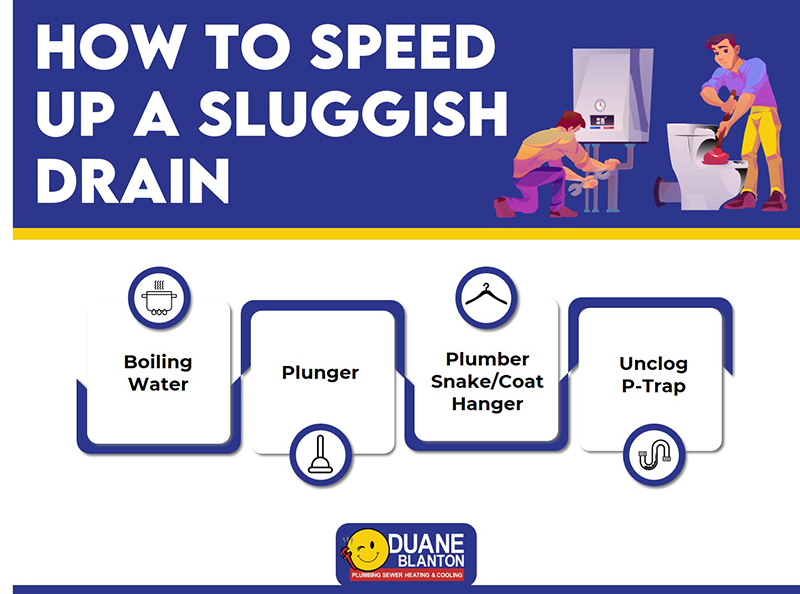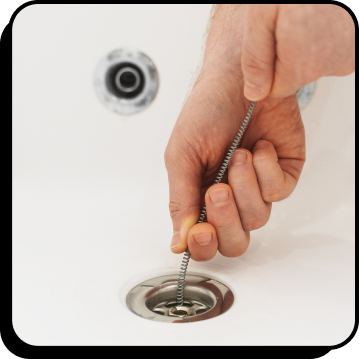As we’ve pointed out previously, there are several substances to never pour down the drain, as they will lead to clogs and overflows in a kitchen sink. Sometimes, though, something slips by and finds itself lodged in the pipe, stopping up a sink, and leading to an excruciatingly slow drain. When these situations strike, the first step doesn’t always have to be to reach out to a plumber to fix the issue, though they can offer expert advice even if you want to tackle the drain on your own. If you do want to tackle the work yourself, here are some ways to try to dislodge a clog and speed up a sluggish drain.
Boiling Water
This slow-draining home remedy is perhaps the easiest — boil a large pot or kettle of water, and pour it down the affected drain. Make sure the water is at a full, rolling boil, and that the drain is as clear of standing water as possible before pouring the water down the drain. It may take a couple of tries, but boiling water can loosen up a clog enough to push it through the pipes and get the water draining normally again. If the water backs up while you’re pouring, stop pouring, and let the water cool down. Let as much of the water drain as possible, reheat more water, and begin the process over.
A Plunger
You may not want to use the same plunger you have in the bathroom for your kitchen sink, but in general, a plunger is a solid tool to try to dislodge debris clogging up your sink. Position the plunger over the kitchen sink’s drain, and plunge as usual. This will force air into the drain, increasing the pressure, and working to force the stoppage through the pipes.
A Plumber’s Snake or Coat Hanger
An auger, colloquially known as a plumber’s snake, is a long, thin tool with sharp teeth or a coil running down the length of its body. Feeding the snake into a drain will let you pinpoint where the clog in the drain is located. Once you feel the resistance from the clog, work the auger back and force in the drain, in a “sawing” motion, to break up the pesky blockage. Once you feel the blockage loosen, run hot water down the drain to clear it out, and check to see that it’s fully removed.

If you can’t locate a plumber’s snake, a wire coat hanger can work in its place as a sluggish drain home remedy. While it won’t reach as far as an auger, or have the specialized design, unwinding the wire coat hanger and feeding it into the drain in the same fashion can result in the same effect. Run the coat hanger through the drain until you hit the clog, then work the hanger around until you feel the clog loosen up, following up with a flush from some hot water.
Unclog the P-Trap
Landing on the more involved end of home remedies, clearing out the P-Trap is a bit of a process, and is specific to sinks. Underneath the sink, the P-Trap is the u-bend piece of pipe that connects the faucet to the wall. Before removing the P-Trap, ensure that the water to the faucet is shut off and that a bucket is placed underneath, to catch any debris or water that may fall out. The P-Trap itself can be fairly easily unscrewed at either end of the “u”.
Once removed, it can be manually cleaned of clogs using a bucket of water, or a hose, and some form of wiry brush, ensuring that all debris has been thoroughly cleaned out. Reattach the P-Trap, turn the water back on, and let your faucet run for a bit to make sure everything runs smoothly.
If after trying all of these tips, you’re still having slow and sluggish drain issues, or to make sure you’re completing the steps of any of these tips correctly, give a call to the professionals at Duane Blanton Plumbing, Sewer, Heating & Cooling at (815) 219-4323, or shoot them a message through their online scheduling portal. The expert team of professionals at Duane Blanton Plumbing, Sewer, Heating & Cooling is more than happy to put their knowledge to use to help you will any drain issues or any other major plumbing concerns that might arise. Don’t let a sluggish drain slow you down in the kitchen, reach out to Duane Blanton Plumbing, Sewer, Heating & Cooling today!
